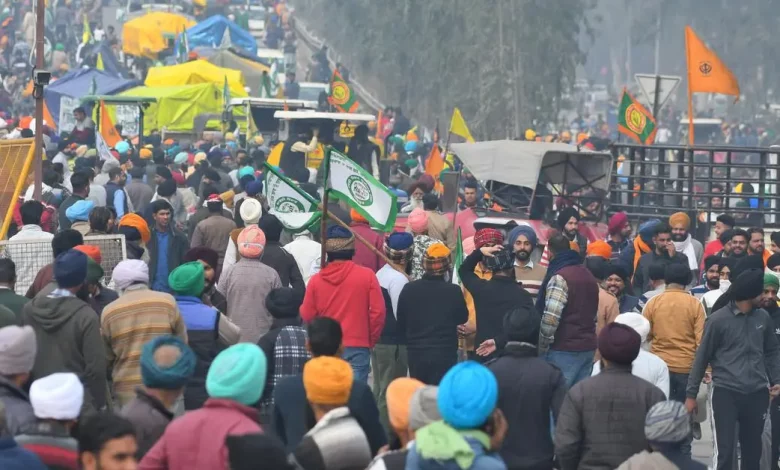Farmers’ protest urges the implementation of MSP law
Syllabus: Agriculture, Economic Development[GS Paper-3]

Context: More than 200 farmer’s unions from Punjab march to Delhi to request a legal assurance of minimum support price (MSP).
Key points:
- Thousands of farmers from Punjab are marching to Delhi to demand legal guarantees for the minimum support price (MSP).
- Security measures have been increased to prevent the farmers from reaching Delhi.
- The farmers’ main demands include the implementation of the Swaminathan report, loan forgiveness, and a law for MSP.
- The march is being led by the non-political organisations Samyukta Kisan Morcha and Kisan Mazdoor Morcha.
Minimum Support Price (MSP):
The MSP in India is a price set by the government to guarantee farmers a minimum income for their agricultural produce, protecting them from sudden drops in market prices and encouraging more agricultural production.
Why is it necessary for the farmers to have a law on Minimum Support Price (MSP)?
- Farmers do not have the ability to control the prices at which they sell their produce, unlike most industries where companies can set the maximum retail price.
- Instead, farmers have to sell their products at prices determined by the supply and demand in the market.
- Farmers operate in a market where buyers have the advantage.
- They harvest their crops in large quantities, resulting in an oversupply compared to demand, causing prices to decrease.
- This gives buyers more control over prices rather than the farmers.
- Additionally, farmers have to buy their supplies at retail prices, which further exacerbates their situation.
The need for agrarian reform is necessary:
- Nowadays agriculture corresponds to around 15% of the cumulative output and offers about half of the workers both the direct and indirect jobs.
- The demonstrations in townships that we are witnessing become adamant about the discomfort of farmers.
- In the past, the agricultural policy of the government was focused on more output and food security, rather than paying attention to low farmers income problems.
- Critical drops in the case of international rivalry have decreased export value and caused depreciation of the local pice as compared to the imported goods.
- Farmers and villagers who depend on natural resources for their livelihood are frequently vulnerable to disasters such as natural disasters and crop failures due to which their poverty increases.
- The sum of population growth, job substitution by agricultural activities such as fish farming, and land conversion from primary production is the main factor of the drop in the area of land owned by farmers.
India has a plan to raise the income of farmers:
- In 2004, the National Commission for Farmers was formed, led by Prof. M. S. Swaminathan, to propose ways to improve growth and inclusivity for farmers.
- In 2016, the Indian government established an expert committee, led by Ashok Dalwai, to examine the entire agriculture system and recommend reforms to double farmers’ income by 2022.
- The committee submitted its final report to the government in September 2018.
Government is making efforts to enhance agriculture:
- The objective of income enhancement of the agricultural producers cannot be accomplished without giving support to its nutrition and variousness.
- The government has many subsidy programs to facilitate the farmers in a way of providing subsidies on fertilisers, crop insurance, credit, irrigation and other agricultural related things.
- These subsidies, which are in addition to the power and irrigation subsidies generously given by the states, even support the subsidies for farm machines, and these account for more than Rs 4 trillion they pay every year.
- Also, through the PM-KISAN Scheme, small and marginal farmers get income support and the Garib Kalyan Anna Yojana is basically developed for free provision of ration to many farmers.
What are the problems or concerns?
- The necessity must arise for a comprehensive change in policy framework, and the state should respond by implementing a more understanding and beneficial system for farmers.
- Among the measures that adversely affect farmers are a wheat export ban, 20% rice export tax, scheduled withdrawals of some commodities from the futures markets, and the implementation of the removal of certain commodities from stock pools.
- The ill-devised input subsidies, especially fertilisers and power, which are over-promoted, and the no-limit procurement of paddy and wheat in some states by the government are also causing environmental damage.
- It becomes a necessity to rationalise and simplify these processes.
Conclusion:
In order to double farmers’ incomes, we need to focus on developing new technologies, products, institutions, and policies that promote sustainable and diverse agriculture. This will require collaborative and ongoing efforts.
Source: DH
Practice question:
Q.Consider the following statements: (2020)
- In the case of all cereals, pulses and oil-seeds, the procurement at Minimum Support Price (MSP) is unlimited in any State/UT of India.
- In the case of cereals and pulses, the MSP is fixed in any State/UT at a level to which the market price will never rise.
Which of the statements given above is/are correct?
- 1 only
- 2 only
- Both 1 and 2
- Neither 1 nor 2
Ans: “D”
Q. What do you mean by Minimum Support Price (MSP)? How will MSP rescue the farmers from the low income trap? (2019)





.png)



